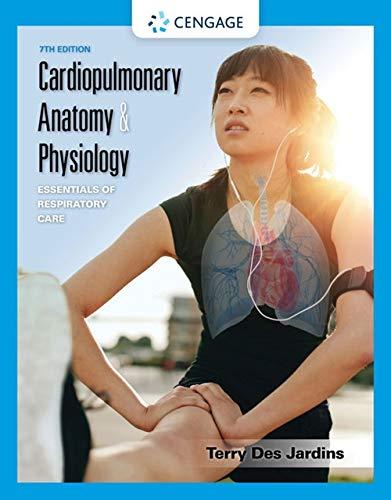
Introduction:
Aging is an irreversible process that occurs despite optimal nutrition, genetic background, surroundings, or activity patterns. The bodily functions decrease as a person ages and the organ functions are also affected. Lungs are also affected likewise, as it reaches the final growth stage at the age of 20 years and after 25 years of age the quality of the lungs gradually decreases.
Answer to Problem 1RQ
Correct answer:
As an individual ages, the vital capacity decreases.
Explanation of Solution
Justification for the correct answer:
Option (D) states that as an individual ages, the vital capacity (VC) decreases. This is a true statement as VC is the maximum amount of air that a person can expel from their lungs after inhalation. VC is equal to the total lung capacity (TLC) minus the reserve volume (RV). Hence with age, the reserve volume increases, which leads to a decrease in VC with increasing age. Hence, option (D) is correct.
Justification for the incorrect answers:
Option (A) states that as an individual ages, the residual volume decreases. This is false, as with age, the alveoli enlarge and the airway starts to close. Hence, the residual capacity generally increases with age. So, it is an incorrect option.
Option (B) states that as an individual ages, the expiratory reserve volume increases. This is not true, as with an increase in residual volume (RV), the expiratory reserve volume (ERV) decreases due to reduction in chest wall compliance and the increase in air trapping. So, it is an incorrect option.
Option (C) states that as an individual ages, the functional residual capacity decreases. This is a wrong statement because it is the volume that remains in the lungs after the elastic recoil balances the expansion of chest wall. With age, this elastic recoil decreases and is not able to balance the chest wall expansion. Therefore, the functional residual capacity increases as a person ages. So, it is an incorrect option.
Hence, options (A), (B), and (C) are incorrect.
Thus, it can be concluded that as an individual ages, the vital capacity (VC) decreases due to the increase in reserve volume.
Want to see more full solutions like this?
Chapter 11 Solutions
Cardiopulmonary Anatomy & Physiology
- The average compliance of the lungs and chest wall combined is 0.1 L/cm H2O. 0.2 L/cm H2O 0.3 L/cm H2O 0.4 L/cm H2Oarrow_forwardGas flow decreases as ________ increases. resistance pressure airway diameter frictionarrow_forwardThe mean intraluminal pressure in the pulmonary capillaries is A. 5 mm Hg B. 10 mm Hg C. 15 mm Hg D. 20 mm Hgarrow_forward
 Cardiopulmonary Anatomy & PhysiologyBiologyISBN:9781337794909Author:Des Jardins, Terry.Publisher:Cengage Learning,Basic Clinical Lab Competencies for Respiratory C...NursingISBN:9781285244662Author:WhitePublisher:Cengage
Cardiopulmonary Anatomy & PhysiologyBiologyISBN:9781337794909Author:Des Jardins, Terry.Publisher:Cengage Learning,Basic Clinical Lab Competencies for Respiratory C...NursingISBN:9781285244662Author:WhitePublisher:Cengage Anatomy & PhysiologyBiologyISBN:9781938168130Author:Kelly A. Young, James A. Wise, Peter DeSaix, Dean H. Kruse, Brandon Poe, Eddie Johnson, Jody E. Johnson, Oksana Korol, J. Gordon Betts, Mark WomblePublisher:OpenStax College
Anatomy & PhysiologyBiologyISBN:9781938168130Author:Kelly A. Young, James A. Wise, Peter DeSaix, Dean H. Kruse, Brandon Poe, Eddie Johnson, Jody E. Johnson, Oksana Korol, J. Gordon Betts, Mark WomblePublisher:OpenStax College Human Physiology: From Cells to Systems (MindTap ...BiologyISBN:9781285866932Author:Lauralee SherwoodPublisher:Cengage Learning
Human Physiology: From Cells to Systems (MindTap ...BiologyISBN:9781285866932Author:Lauralee SherwoodPublisher:Cengage Learning





